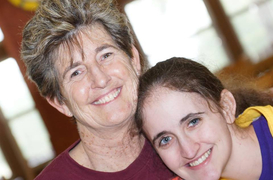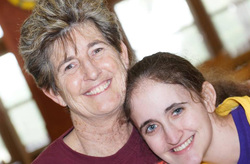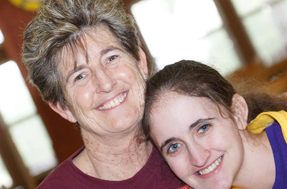 Receiving a chronic and life changing diagnosis, such as MS, brings changes to your life that are both expected and unexpected. When we first received our daughter’s MS diagnosis 16 years ago, we had the love and support of our families and of our friends. We were constantly asked if there was anything we needed for our daughter and for our older children. As time passed and her disease was not as obvious to the eye, we became used to the remarks of “If she looks good, she must be fine”. With that the concerns and offers declined as well. As our daughter became less able to maintain normal activities of her friends, it was heartbreaking to see them move on with their lives without her. Her fatigue and cognitive problems kept her from competing in sports and nightly social activities, such as her Church Youth Group. I am not sure she fully understood or even noticed that her friends were living their lives without her, but it broke my heart to see her alone. The unexpected result of her MS is seeing that our adult friends are following the same path. Yes, they do realize the extent of her illness and how it has made it impossible for us to leave her home alone. What has happened is that they have also continued living their lives without realizing that we are very limited to join in. We are at the stage of our lives when we thought we would be able to come and go on a whim, without having to worry about having a babysitter. The evils of social media lets us see how our lives could have been had MS decided not to enter our lives. I wish that family and friends realized that this is a lifetime disease that does not get any easier to live with. Yes, we learn to live with the demands that MS has put on us. But this does not lessen the need for us to have help and moral support from those in our lives. Being a caregiver can be a very lonely and isolating job. I am thankful for my MS Caregivers I have met on social media, but to have our friends remember that we are still here fighting this battle would benefit everyone. -Laurie  Most MS patients most likely wait a long time before you receive the Multiple Sclerosis diagnosis. Since there is not a definitive test that positively discloses MS, it seems that neurologists are hesitant to give the chronic diagnosis quickly. This is even more obvious when a child presents with MS symptoms. When our daughter was 10 years old, in 1999, it was not believed that children could develop MS. We lived with an alternative diagnosis of ADEM. Acute disseminated encephalomyelitis is typically a one time episode with symptoms that mimic MS. We lived with this diagnosis for almost 2 years while she experienced several attacks. At this point, we were told that even though it was still believed that she did not have MS, she would be treated for the disease since the neurologists did not know what else to do. After 8 years living with the ADEM diagnosis that was just being stubborn, we were given the official diagnosis. Because of living with the hope for such a long time that she would outgrow these attacks and be able to live a full life, denial was always our fallback. As much as our adult MS specialist that worked along our pediatric neurologist was convinced she had MS, I think deep down we were hoping he was wrong and someday we would get our daughter back. Now that we are 15 years into this journey, we know that she will never return to her former self. The best we can hope for now is that she slows her decline. I imagine that adults faced with the same diagnosis also have a very hard time admitting that this is a chronic illness and it will impact their lives to some degree. The hardest part about seeing your child or any loved one go through this disease is that there is nothing you can do to fix it. The best we can do is to be there for moral support. The best thing we can do for ourselves as caregivers is to reach out to others who are also experiencing the same life altering situation. We are lucky to have the internet and social media available to be able to find so many struggling with the same feelings. I don’t know if I would have been able to get through the rough patches if not for social media and the ability it gives us to connect. Even if you know of others with MS, every patient is unique in their symptoms. The better the ability to connect with others on the social media pages helps us immensely. If you are a caregiver of a child with MS, please join me on the Facebook group Pediatric Multiple Sclerosis Alliance. -Laurie Being a caregiver to a MS patient doesn’t mean you are immune from your own health issues. I was diagnosed with a seizure disorder 22 years ago, but have been seizure free for over 7 years with the help of medications. I had always thought my family would be well prepared to take care of my daughter if for some reason I was not around, either for medical reasons or a much needed vacation. I did experience a seizure a couple of days ago, recovered relatively quickly, but long enough to bring a dose of reality to my family.
I had always thought it was understood that my daughter’s daily medications were handily available for whomever needed to step into my place. You can imagine my surprise when I was asked to write a list of her daily needs in case this happened again. This was a reminder that I should not be in sole care of my daughter and I need to make sure others know of her daily needs on a regular basis.  It is a fine line as a caregiver that we walk when taking care of our MS patients. It becomes a lot more apparent when we are caring for our teenagers. I feel that teenagers have the hardest job accepting their MS diagnosis than do other age groups, including young children. All teens just want to be like everyone else with normal teenager problems. This new life of theirs of living with MS magnifies this time of year, when school is back in session accompanied by all of the extracurricular activities. How we decide when to interfere or let them handle situations themselves is not easily decided. We want to have our teens learn to become independent adults, but the added stress of life with MS makes us want to do more for them than we probably should. As we are shifting from the carefree summer life to the fall routines, it is a strong reminder to our teens that they are not the same as their friends and never will be again. As caregivers, we are not only taking care of their medical needs, but also their psychological ones as well. For the most part our kids are very strong when living with their MS, but ultimately there will be major meltdowns. The reality of living with a lifelong chronic disease is often overwhelming for anyone. As a Mom or Dad, it is our job to help them to try to accept “it is what it is” without breaking down ourselves. It is very important for outside counseling to be involved as it is our job to be Mom and Dad and not the psychologist. We are hardly objective as our hearts are breaking as much as our child’s. Mom and Dad are the easiest target for the teen or young adult to lash out at when their MS is overwhelming, which is why an objective counselor will benefit everyone in the family. -Laurie A little bit about me...I am a MS Caregiver for my daughter, who has had MS symptoms since she was 10 years old. Pediatric MS was rarely recognized in 1999 when we began our MS Journey. 14 years later, I am passionate about finding ways for other families to connect with each other as we are forced to confront this chronic illness. I find a lot of support thanks to the internet and a Facebook group Pediatric MS Alliance. From this group, I have met many families from around the world that are also feeling isolated. From this Facebook group, we have formed the website www.pediatricms.org and are in the process of obtaining nonprofit status, with the goal of connecting families in person as well as informing families of activities and information designed for the pediatric MS patient. During a meeting at my desk one day my phone rang, I apologized while I reached to silence it. One thing struck me though; it was my husband calling at 10:30 while he was at work. This was unusual so I apologized again and said it may be an emergency – it was.
My husband had not been feeling well that week and the stress of his work plus a virus had come to a head and one of his coworkers was taking him home. When I arrived I realized that this situation was more serious than just giving him some help up the stairs. We had a little food (he could barely put fork to mouth) and got back to the car on our way to the emergency department. My husband takes Tysabri and is JC positive so first things first – double check we are not having that nasty what’s-it-called virus and fast. The answer ended up being not that virus but another (less deadly) one. Whew. Unfortunately my poor man had to have a spinal tap and this produced a spinal headache that made him bed-ridden, well, even more bed ridden. In spite of everything the doctors said about a recovery, my man seriously thought he was dying and said goodbye to me several times. I cannot describe for you how difficult it was. Although we did have a lot going for us; an amazing support system including family, friends, neighbors and co-workers. He was off work for several months; this could have been a turn for the worse for him and our family. But do you know what he did instead? He began to focus on his health. Yes HE focused on his HEALTH (not something that many of us are trained to do in this society of over indulgence and over work). No one can do this for your loved one...they have to decide that they, or rather their health, is literally their main focus. You can suggest it but unless that person consistently is thinking what can I do today to improve my health and believes there is hope...well, it just won’t work out unless it’s their own deeply held vision. You can, however, help them chase down their vision once they have it. For example, if your loved one no longer eats any processed food, don’t offer it to them! Or better yet don’t bring it to the house or even eat it in front of them. I read all the books and tried to help with meal planning (this is not strength of mine I am still working at it). Anyway if you want someone to feel supported in a positive vision of their future– participate! He reached out to the MS community and sought out resources that changed his lifestyle. You might be wondering, what was the result? He got better, much better than before he got the virus in the first place. He lost weight, gained muscle and a much better outlook and attitude. Now I think he knows that he has control and accountability for the way that his disease progresses. Not to the extent that we may like (go away forever MS) but he can control how much energy he puts into his health and this CAN directly impact outcomes. It is a lesson that we can all benefit from. You can get results that you are willing to work for. Thanks to my strong man! Looking forward to a million years of putting in work right next to you!  Multiple Sclerosis is a little known disease, until you receive the diagnosis. If you were like our family when we heard that our daughter was stricken with this chronic disease, we assumed that MS would not severely alter her life. After all, Multiple Sclerosis may alter her physical capabilities, but she will be able to live a full life while learning to overcome the physical limitations now facing her. After a few years, we were given a dose of reality to the cognitive challenges that often accompany MS. As an adult, I can only imagine that there are a wide variety of MS specialists ready to aid you on your journey, fully educated about the ramifications of your disease. Having a child with MS did not give us that base of knowledge, especially when it came to her education. When our daughter was diagnosed at 10 years old in 1999, it was not even believed that children get MS. This led to a school system which had no idea what to expect of our daughter and her capabilities, or lack thereof. We were very lucky to have a school system that was cooperative in assisting us, but since we were in the dark about cognitive difficulties being caused by MS, it was like the blind leading the blind. I think back to times when the school staff tried to get her to act like other students her age, not knowing the MS would cause her to “have no filter” and she would not be able to easily alter her behavior. It was about 3 years into our journey that she had her first Neuro-psych exam and we and the school realized she was no longer a main stream student. She was able to receive all special needs services as her cognitive abilities declined as she grew older, thanks to a school system who fought for her instead of thinking we were enabling her. We know of many kids today that have been diagnosed with MS that are in constant battles with their school systems. Neuro psychological exams have helped, but it is a work in progress for schools to realize the impact MS has on a child’s educational needs.  Being a parent of a child when she is diagnosed with MS is hard enough without having to convince people that it is OK to develop relationships with the patient. A dear friend of mine has a daughter who is 24 years old and was diagnosed with MS about 7 years ago. MS has been cruel to her daughter, leaving her with a lot of pain and physical limitations. She has given up her dream of going to college and making a life for herself because of her MS. Every parent dreams of the day when your child finds another person to share the rest of their life with. Imagine trying to see this happen with a child with a chronic illness, such as MS. It is saddening to see how scared the public is of a disease that they do not take the time to educate themselves about. A MS patient is trying to make a normal life for themselves, wanting the same emotional connection with someone special that others share. I have often said that being a parent of a MS patient does not give me the choice of walking away from my daughter. Significant others and spouses do have that option if they can not handle the fact that the MS patient will be on medication for their foreseeable future. But what do you do when the parent of this significant other tells her son that she does not want him to date someone who is sick and on medication for the rest of her life? I understand she has his best interest at heart, but who is to say that this girl is not in his best interest? There is so much more to a person than her disease and she contributes just as much if not more to a relationship than a "healthy" person can. MS patients are far more empathetic than most people, a trait I feel is so important for everyone. We need to find a way to educate society about MS and other invisible chronic diseases and move past the ignorance and fear that seems to overrule common sense.  Who doesn’t look forward to an escape from reality, especially when planning a vacation? So many plans are made in anticipation of going on vacation, trying to do as much as possible in the time you have available. Unfortunately, MS never takes a vacation. It can be a challenge to remember the needs of your MS patient as you are planning your days full of activities. A change in the daily routine of an MS patient can bring back even the most minor of symptoms. On two recent long weekends in a row of traveling with my daughter, I forgot about her need for rest and scheduled bathroom breaks. She has always had incontinence problems at night, but when we are on the go more than usual, this also presents during the daytime as well. Her difficulty with focusing on more than one thing at a time makes it hard for her to realize her need to pay attention to her body, especially when she would much rather be involved with activities her family and friends are participating in. It is also important for me to remember how long she has been on her feet and if she has been a lot more active than her usual schedule. I have found on too many occasions that if I am not careful in making sure she gets enough time sitting down, she will develop painful muscle spasms and not be able to stand or even sit alone. I also have to make a much stronger mental note to remind myself about giving her her nighttime medications. When I am at home, there is a routine in place for taking her meds. While on vacation and being on a different schedule, it can be easy to forget to administer her nightly doses. I could go on...but the point is that her MS is always there, no matter where she is. There is no escaping the reality of MS. But with some helpful tips to remind you to watch over your MS patient during your getaway, we all can get a small break from our lives with MS. -Laurie A little bit about me...I am a MS Caregiver for my daughter, who has had MS symptoms since she was 10 years old. Pediatric MS was rarely recognized in 1999 when we began our MS Journey. 14 years later, I am passionate about finding ways for other families to connect with each other as we are forced to confront this chronic illness. I find a lot of support thanks to the internet and a Facebook group Pediatric MS Alliance. From this group, I have met many families from around the world that are also feeling isolated. From this Facebook group, we have formed the website www.pediatricms.org and are in the process of obtaining nonprofit status, with the goal of connecting families in person as well as informing families of activities and information designed for the pediatric MS patient. Has reading become challenging for your loved one with MS?? Have you heard of The Talking Information Center? It is an award winning radio reading service that broadcasts the reading of printed material. Access to their service is provided over an extensive network of radio and cable TV outlets as well as streaming online twenty-four hours per day. They also stream audio on their web site, and are now offering podcasts . To get more information, call 1-800-696-9505. or visit http://ticnetwork.org/
If you visit their website, click on the "Listen Live!" icon in the top right hand corner to try it out. It is free! To make things easier for you, we are listing new posts in one location. Please visit our "News and Events" page each day (you could bookmark it!) to see what has been newly posted on HealthCare Journey (see link below). Thanks so much for visiting the site!
http://www.healthcarejourney.com/news--events.html |
Welcome to Our New Caregiver's Blog! If you would like to become a blogger, please contact us at... admin@healthcarejourney.com!
Archives
September 2015
Categories |
- Home
- About Us
- Virtual MS Center
- News & Resources
- Seminar Registration
- Health & Wellness
- Blogs
- About MS
-
Symptoms
- Balance and Walking Issues
- Breathing/Respiratory
- Bowel Dysfunction
- Cognitive Dysfunction
- Crying/Laughing Uncontrollably (PBA)
- Depression and Anxiety
- Dizziness/Vertigo
- Dysphagia
- Fatigue
- Foot Drop
- Hearing or Smell or Taste Changes
- Heat Sensitivity
- Leg Weakness
- Loss of Hand Dexterity and Coordination
- Memory and Mutliple Sclerosis
- Migraines
- Numbness/Tingling/Altered Sensation
- Nystagmus and Oscillopsia
- Pain
- Sexual Dysfunction
- Sleep Issues
- Spasticity/Spasms/Cramps
- Speech/Swallowing
- Urination/Bowel Problems
- Vision
- MS Clinics
- MS Topics
- Register With Us
- Terms of Use/Privacy/HIPAA
- MS HealthCare Journey

 RSS Feed
RSS Feed
